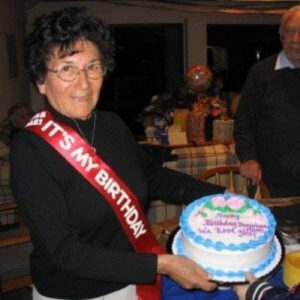Genevieve V.

My 95-year-old mother nearly died of septic shock on April 15, 2019. I didn’t know what sepsis was – like most, I thought it was some infection that a person catches while they’re hospitalized. Mom has congestive heart failure (CHF), and her ejection factor (EF) was already at 20% – 24%; a normal EF is about 60%. She had dinner, walked the dog, and then went to bed at 9:30 P.M. (She normally goes to bed at 11:00 P.M.) Something wasn’t right, but I didn’t know what it was. She was in bed, buried under the covers. I asked her what was wrong and she told me she had vomited a couple of times. I asked her why she hadn’t told me, but I didn’t really get much of a sensical response. She told me that she was feeling cold, wanted to sleep it off and not get up out of bed.
I called my daughter, who is a nurse, and asked her if she thought I should take her to the ER, and she advised me to do so, due to her age. I tried to get her out of bed, but as she stood, she was wobbly and had lost control of her bowels. Her hands began to shake rapidly, like a pianist on steroids, playing chords on the piano. I asked her where her glasses were and she insisted that she was wearing them, but she wasn’t. I asked her if she had taken her BP med, and she went back and forth with telling me she had/had not taken it. I told her I was going to call the paramedics, but she wanted for me to take her to the hospital myself. When she tried to stand, she couldn’t balance. She wasn’t in pain and didn’t seem to have a fever. I thought she had food poisoning due to her throwing up and diarrhea.
It took me about 15 minutes or longer to walk her to my vehicle, which was parked in the garage. When we got to the hospital, there were men at the front door who brought a wheelchair and assisted me with getting her in the ER. Her BP was low, but no one told me how low. It wasn’t until she was in a bed and tests were run that I found out it was 75/49. She normally has medium to high BP. After IV fluids, IV antibiotics, and a chest x-ray were given, the ER doctor said he was going to admit her to the hospital. The admitting doctor began to tell me that my mother was “a very sick woman”. He wanted to know if I was the one who would be making decisions on her behalf for her care. He wanted to know if she had an Advanced Directive (AD). She had one from 2016, which said, Do Not Resuscitate (DNR) no life saving measures. I told him that she had been hospitalized in November 2017 and February 2019, and on both occasions she was given life saving measures. She didn’t want the paddles or intubation, from what I understood later, but at the time, I told him we needed to try to do what was necessary to save her life.
He asked me if I was willing to take responsibility for her and I said that I would. I wasn’t exactly certain what that meant, but he explained that the beta-blockers could raise or lower her BP. Since it was already near deathly low, it could get lower or it could be elevated. With doing nothing – she was going to die, with doing something – there was a 50/50 chance of her surviving. I still was not told she was in septic shock. They took blood about every two hours. They ran cultures, but said it would take days for them to come back because they had to grow. Then they finally admitted her to a room in ICU. Later that morning, we were given patient education videos on sepsis to watch. I’m sure her brain was too foggy to watch them, as she was so weak and exhausted, and her cognitive function wasn’t all there.
My mother was in the hospital for seven days on IV fluids and antibiotics, and then she was given the choice to go home on the IV antibiotics or into a skilled nursing facility, which she did. Her tests came back for strep-pneumonia. (Sepsis and Pneumonia) At first the ICU pulmonary doctor thought it was a staph or strep. The infectious disease doctor was monitoring her as well. My suspicions are that since she was hospitalized two months prior with a cough and difficulty breathing, she was battling allergies and pneumonia then, but was not diagnosed nor given medication for it, and it got worse, so her body went septic to fight off the infections.
It’s been nearly seven months since this episode and it took her about four months to get back her strength. I don’t know exactly what organs have been compromised or gotten worse, but her EF remained the same.
By the grace of God, it is a miracle that she is alive with no limbs or organs lost or damaged. I think some cognitive issues are there, but she is 95, so it’s difficult to know what is age related and what are the consequences of sepsis. Getting her to the ER within 3-4 hours, after she had the symptoms, I described above, was definitely key. Having a hospital medical team trained to recognize sepsis that sprang into action, as well as our strong faith in the Lord, which I attribute to the wisdom, leading and guidance of her medical team – all worked together for her good.
Source: Kathy, daughter






























